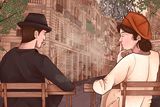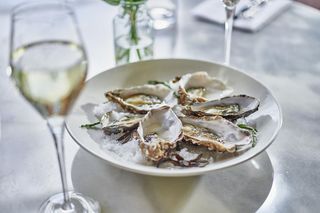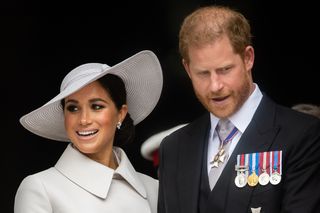New Irish Writing: The Great Escape by Michael Kane


They met in the Rue Saint-Jacques. The sun was shining. It was past half four. It was still quite hot. He was in a worn-looking dark suit with no tie. She wore a bright cream summery dress. Both had cigarettes dangling from their lips. The way he wore his hat made him look almost like an American. Her beret was genuinely Parisian. She had just bought it the previous day. But both were Irish.
They were each on their own, sitting at adjacent café terrace tables. They sat with their backs to the wall of the café, looking out at the street, observing the passers-by, smoking.
When he asked her, in exaggeratedly slowly pronounced English, whether he might look at the menu on her table, politely gesturing at the item in question, she was surprised. Especially at the unmistakeable Dublin accent. Even a little disappointed. But it was also a relief. It was so much easier to relax — and get into conversation with a strange man in a café in Paris in 1956 if he also came from Dublin. It was somehow even much easier than it would have been with a similarly attired strange man in a café on O’Connell Street in the same year.
There was just a little disappointment on his side too, when he heard her “Oui, m…, yes, of course,” also giving away her Dublin origins, but he didn’t let it show.
“You’re Irish,” he said.
“Yes. You sound as if you must be from Dublin too,” she said.
Of course, he was. She had known that immediately when he had spoken.
While they each relaxed considerably when they realised that the other was not so strange or exotic at all as first appeared, a certain tension remained in the warm air between their two tables. He was still a man and still really a strange man, even if he was Irish and she was still a woman, and both were in their 20s and on their own, at least for the moment, in a strange city. And this was 1956.
The cigarettes helped a lot. As they do. You can do a great deal behind a cigarette. You can hide your shy embarrassment, for example. You can pause to think... To consider your next move… What might be his next move… Or how to react, what to say. You can say nothing at all, just look into the distance and inhale… Or exhale. Artfully. Thoughtfully. Like one of those actors in the films. Like one of those French intellectuals. Everyone in Paris seemed to look like a famous writer, like one of those interesting people one heard of. Jean-Paul Sartre. Simone de Beauvoir. You could look like an interesting person. With a cigarette… Only the French had a certain way of holding theirs. You would just have to learn.
She had already noticed, in the less than 24 hours she had been in Paris, that the French always seemed to have a certain stylish way of doing everything. Nonchalantly, but impeccably French. Nonchalant. Im-pecc-able. Just saying the word with a French accent made the most trivial thing sound impeccably French. And the cigarettes smelled different here too. Like the coffee. Fine, coarse, bitter, sweet. How could something be like all of that at the same time? Contradictory. Au contraire. She had enjoyed thinking about how you could think about such things behind a cigarette, while you were on your own, sitting on the terrace of a café in Paris, watching all those stylish passers-by passing by.
Read more
But now she was not on her own. And this was where a cigarette could really help. Especially when you were sitting down, almost beside this strange man. With a Dublin accent. And quite good-looking. She had noticed that too. Without turning around too obviously to look. Despite the rather worn-looking suit. The hat set off his face well. Gave it a certain poise. She was, to tell the truth, glad that he was not an American. What would she have done with an American? He seemed relaxed, self-assured. But not that sure of himself. Not that confident. And if he had been French? That would have been dangerous, of course. Exciting… very interesting, yes, but dangerous. Everyone knew that… Liaisons… At least you knew where you were, to a certain extent anyway, with a strange man from Dublin.
He explained that he was not staying in Paris long, but he was on his way to Rome. With his sister and their aunt. By train. They had gone to look at the shops this afternoon and he was meeting them later.
She was evidently amused at this.
“But I am also going to Rome,” she revealed. “With my mother. We’re getting the night train tomorrow.”
She was so glad her mother had said she needed a lie down in the afternoon after their long lunch in that café on the Boulevard Saint-Germain. Just off the Boulevard Saint-Michel. The Boul’ Mich’. She remembered that from French class in school. Her mother was half hoping to spot Simone de Beauvoir. It was just as well she hadn’t. God knows what she might have done if she had! After a few sips of that nice white wine over lunch she had become rather voluble, referring to some of their fellow travellers as ‘real holy Joes’, possibly spies for “one knew who”, by which she meant the archbishop, of course. They would have to be careful, she said, if they were going to get to Rome on this ‘pilgrimage’ — and she so wanted to see Rome. Not so much to see the Pope, of course! But the art and architecture! The Colosseum and the Pantheon and the Forum too. And here they were in Paris already! Wasn’t Paris beautiful? Of course, the drains! Sometimes you just had to hold your nose. But didn’t it feel like they had escaped? Her daughter had to agree, if in more restrained tones. Couldn’t one almost taste the freedom, the liberté, her mother said, taking another sip from her glass.
“You can see that people think for themselves here! Can’t you just see it in how they walk?”
If Simone de Beauvoir, or anyone of ‘the second sex’ remotely resembling her, had walked by at that moment, the daughter feared her mother might have shot up and embraced her on the spot without even saying an awkward word of introduction.
It turned out the strange man was also getting a night train to Rome, but the following evening. They were going to see a bit more of Paris first.
His name was Jack, by the way. Like the street! She laughed at that. Now she could no longer think of him as the strange man. Hers was Mona.
“Like the Lisa!” she quipped.
He laughed out loud at that.
“Very witty,” he said, as he continued to chuckle.
When she took out a fresh cigarette, he held out his lighter and lit it for her. That was an awkward moment. A degree of intimacy she wasn’t prepared for. It was well she had the cigarette to focus on.
He suggested they have another coffee and, before she knew it, and although he had less French than she had, he had ordered from a waiter standing at the end of the terrace — just by pointing at their empty cups.
She discovered he worked around the corner from her office in Dublin. And a friend of his from school lived on the same street where she lived with her mother. He was a clerk in a big firm, but he didn’t think he would stay there long. He was studying a bit at night. His aunt — his father’s older sister — was very religious, he said, and ever since Holy Year she had wanted to go to Rome, to the Vatican to see the Pope. She didn’t have any children of her own and when they were younger, she had promised to take him and his sister with her to Rome one day. His aunt had probably hoped some of her piety would rub off on them. When she laughed at this, he realised he was in safe company and explained that his father never had much time for religion and neither did his mother or his sister. He and his sister were coming along for the jaunt. The jaunt with the aunt, he called it. And so far, they were loving it.
“Paris!” he exclaimed. “We are in Paris! Can you believe it? This is the life!”
She agreed and said it was marvellous. So beautiful! And exciting! With so many people, so many places to see. Just walking along the river in the light. She told him that her mother felt they had escaped. … As if they had been in some prison or something up to then.
He said, “That’s it! That’s exactly it! … Here’s to escape! (But don’t tell my aunt!)”
He lifted his little espresso cup in the air between them as if to raise a toast and she found herself laughing and doing the same, reaching across to clink her tiny cup against his.
Then she looked at her watch and realised she would have to go very soon. She had said she would see her mother in their room at six. It was just down the street, but she would really have to go in a minute.
“That’s funny,” he said. “We’re staying just up this way, at the École des Mines.”
He quickly suggested they meet again the following day, but she thought they might be too busy getting ready for the train. He looked downhearted.
Then he said “Rome! We’ll both be in Rome. Why don’t we meet there? You’ll be there in two days and I’ll be there in three. What about… Have you heard of the Trevi fountain? I don’t even know where it is, but it’s famous. Everybody has heard of the Trevi fountain. We’ll find it. We could say there in three days. Four o’clock. What do you say?”
And she said, “In three days? Maybe… I’ll have to see.”
‘Tre-vi. Friday. Four o’clock,” he said as they were getting up. “Don’t worry about your mother! She’s a liberated woman, by the sound of it. Don’t forget! Tre-vi. Four.”
He smiled at her, lifting his hat for a second. She smiled in reply. She walked quickly down the Rue Saint-Jacques. He lit another cigarette before sauntering up the street with his hands in his trouser pockets.
Thinking her mother could well be still asleep, she opened the door very quietly. Not asleep at all, she was standing up poring over a map spread out on the little dressing table. It turned out to be a map of Rome. Her mother was already, she explained, planning their great escape — from the Vatican. Of course, they had to see St. Peter’s and the Sistine Chapel, but there was so much more to see, and they couldn’t spend a whole day with the ‘craw-thumpers’, she said. Her daughter laughed. At the same time, she was beginning to wonder how she herself was going to make her own escape in Rome — from her mother — just for an hour or two.
“Look!” her mother said, “That’s the Vatican. Here’s the Colosseum. And here’s the Villa Borghese… Piazza Navona… Here’s the Trevi fountain….”
“Show me!” her daughter said.
Michael Kane, November's winner of the New Irish Writing short story
About the author
Michael is a lecturer and occasional translator. He began his studies in literature in UCD in the late 1980s and completed his doctorate at the University of Bern in Switzerland. He lives in Dublin.














.jpg)

